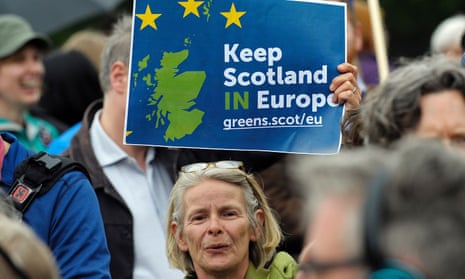Brexit is having a serious impact on the UK constitution. Nowhere is this more marked than in the existential threat that it poses to the United Kingdom. Although the EU referendum was held as a UK-wide vote – with no “quadruple lock” requirements for majorities in each of the constituent nations – the result proves that the UK is divided, with Scotland, Northern Ireland and London voting in favour of remaining, and England and Wales voting to leave.
One of the main arguments for the referendum was that of democracy – that the will of the people should be respected. But perhaps it is the will of the peoples on which we should focus – the peoples of the four nations of the UK, whose desires to leave or remain in the EU should be respected, but distinctly.
But how can Scotland remain within the EU, if the UK acts on the referendum vote? One possibility is that Scotland (and Northern Ireland, London, Gibraltar?) might remain within the EU somehow, even though England and Wales leave.
It is not as unlikely as some make it sound – in 1985, Greenland, a part of Denmark, left the then European Economic Community (EEC) , although Denmark remained.
This is not a straightforward model for our situation. In the event of Brexit, unlike in the Greenland case, the seat of central government (London) would presumably be in the leaving part. Who would represent Scotland in European institutions? And would there be some sort of federal arrangement linking Scotland, Northern Ireland and London in EU participation?
These are difficult questions, but maybe not insurmountable. The EU has a history of flexible and variegated participation that does not always involve single states in homogenous EU memberships. The Isle of Man and the Channel Islands – crown dependencies – are not members of the EU, but a great deal of EU law applies to them. And – an interesting precedent for London (if a product of very different circumstances) – from 1957 to 1990 West Berlin was a member of the EEC, although not, as such, part of West Germany. So the EU is, and has been, open to variegated, differentiated relationships.
But an independent Scotland is also under discussion. The EU referendum, and the risk that Scotland will be denied EU membership against its will, has brought this option back to the table. I make no case for or against the independence of Scotland, but simply examine its potential consequences. If an independence poll takes place and is won, this will lead to the disintegration of the UK. But would secession from one union, the UK, maintain Scotland’s place in another, the EU? Back in 2014, prior to Scotland’s independence referendum, this was a contested issue.
The UK government and Better Together (and even some EU officials) argued that a newly independent Scotland would have to apply through the standard accession process in the treaty, in the same way that new countries, such as Croatia, have done. This view assumes that in voting for independence, Scotland would also be voting to leave the EU. Such a view is very hard to sustain in the face of Scotland’s strong remain vote in the referendum. If anything, in voting for independence, Scotland would be seeking to ensure its EU membership.
I have made detailed legal arguments as to why an independent Scotland should be admitted to the EU without having to go through the full accession process for new applicants. I believe those arguments continue to be persuasive, but I offer here a more general case.
The fundamental issues that inspired the original EEC in the postwar period – namely a search for peace and stability in Europe and the protection of democratic values – are still highly relevant today. Democracy is proclaimed as one of the EU’s values in its treaties, and the union is eager to vaunt its adherence to these values, however much its opponents have decried a “democratic deficit”. As such, the EU’s very raison d’être is at issue. Could it act in such a way as to dispossess Scots of their acquired rights and EU citizenship as a result of the country using the democratic right to vote for independence? Such a move would seriously undermine the EU’s claim to be a promoter of democracy.
More generally, the EU adopts a pragmatic and functional approach that has enabled it to weather many apparently intractable crises in which the treaties have been lacking in specific guidance. This ad hoc, practical approach could also help the EU to weather the issues of Brexit and Scottish independence without a full-blown crisis. There was no explicit provision capable of dealing with German unification in the 1990s. But the (then) EEC responded to this event in a pragmatic manner, enabling a united Germany to become a member without protracted negotiations.
The pragmatic solution to the Brexit crisis would be if England and Wales were, post withdrawal from the EU, to join the EEA (European Economic Area) – sometimes called the “Norwegian option”. An independent Scotland could succeed to what was the UK’s EU membership. As neighbouring EEA-EU states, there would be no problematic “hard” borders between England and Scotland – we can make a comparison with the existing Norway (EEA)-Sweden (EU) border.
Of course, Scottish independence may not come about. And the Norway option may be ruled out for England and Wales. But if Scotland becomes independent, its continued EU membership is not impossible. The EU has long taken pride in being “a new kind of legal order”, very much concerned with individuals and their rights. Our current Brexit dilemmas should not be straitjacketed by monolithic conceptions of political power. Otherwise, the causes of Euroscepticsm will continue to flourish – and, arguably, we will all be worse off.
